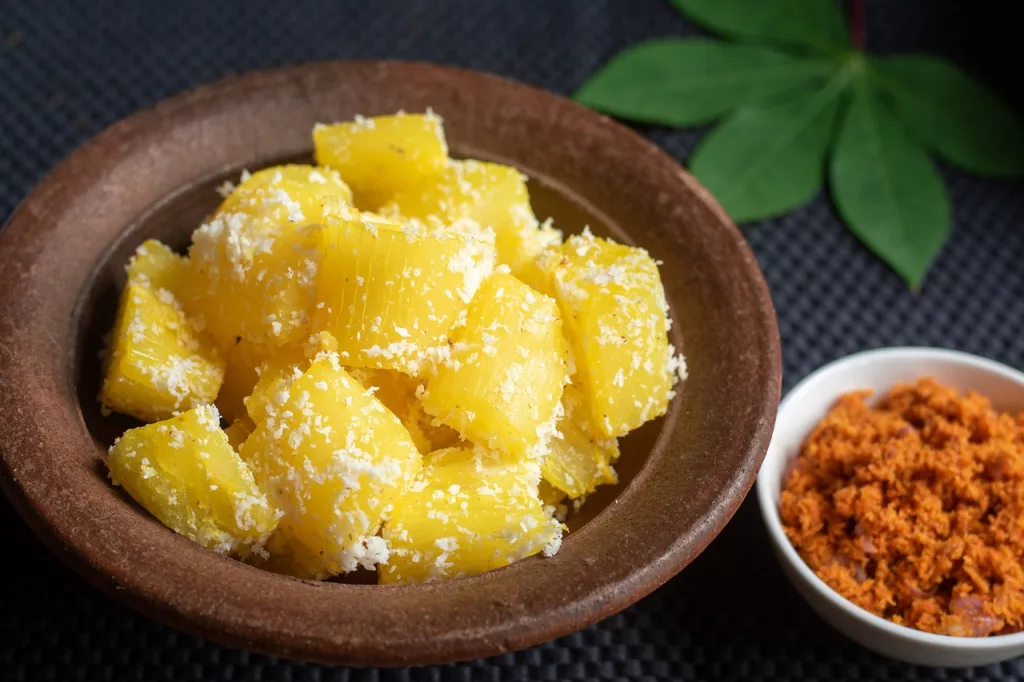In recent years, tapioca has gained popularity as a versatile and delicious ingredient in various cuisines worldwide. This starchy root extract, derived from the cassava plant, not only enhances the taste and texture of dishes but also offers numerous health benefits.
From providing energy to promoting digestion, tapioca has proven to be a nutritional powerhouse. In this article, we’ll explore seven tapioca health benefits and why you should consider incorporating it into your diet.
Table of Contents
Tapioca’s Origin

Tapioca originates from the cassava plant (Manihot esculenta), which is native to South America. It is believed to have been first cultivated by indigenous tribes in the northwestern regions of Brazil. The plant was later introduced to other parts of the continent, including the Amazon rainforest and the Caribbean.
Cassava has been a staple crop for centuries in many South American countries, providing a reliable source of food and sustenance. The plant is well-suited to tropical and subtropical climates, thriving in areas with high humidity and rainfall. Today, cassava is cultivated in various countries across the world, including Brazil, Thailand, Nigeria, Indonesia, and several countries in Africa.
The extraction of tapioca from cassava involves a process of grinding and washing the starchy root. The resulting pulp is then further processed to separate the starch from the fibrous components. The starch is then dried and formed into various tapioca products, including pearls, flakes, flour, and starch.
Tapioca’s versatility and neutral flavor have contributed to its popularity in global cuisine. It is used in a wide range of dishes, from savory meals to sweet desserts, in countries around the world. Tapioca pearls are commonly used in bubble tea, while tapioca flour is used as a thickening agent in soups, stews, and desserts.
Overall, tapioca’s roots can be traced back to South America, where it has been an essential part of traditional diets for centuries. Its cultivation and utilization have spread globally, making tapioca a beloved ingredient in diverse culinary traditions.
Nutritional Value of Tapioca
Tapioca is a starchy root extract that offers several essential nutrients and beneficial compounds. Here are some of the key nutritional components found in tapioca:

- Carbohydrates: Tapioca is primarily composed of carbohydrates, particularly starch. It serves as a rich source of energy due to its high carbohydrate content, making it an ideal food for active individuals and athletes.
- Dietary Fiber: Tapioca contains dietary fiber, which is important for maintaining digestive health. Fiber adds bulk to the diet, aids in bowel regularity, and promotes a feeling of fullness. It also supports a healthy gut microbiome by acting as a prebiotic, nourishing beneficial bacteria in the intestines.
- Calcium: Tapioca contains calcium, a mineral essential for maintaining strong bones and teeth. Adequate calcium intake is crucial for preventing conditions like osteoporosis and ensuring proper bone density.
- Iron: Tapioca provides iron, an essential mineral involved in oxygen transport and the production of red blood cells. Iron is necessary for preventing iron-deficiency anemia and supporting overall energy levels.
- Folate: Tapioca is a good source of folate, a B-vitamin important for DNA synthesis and cell division. Folate is especially vital during pregnancy as it helps prevent neural tube defects in the developing fetus.
- Vitamin K: Tapioca contains vitamin K, which plays a role in blood clotting and bone health. Adequate vitamin K intake is necessary for proper blood coagulation and maintaining optimal bone density.
- Magnesium: Tapioca provides magnesium, a mineral involved in various bodily functions. Magnesium is essential for nerve function, muscle contraction, maintaining a healthy heartbeat, and supporting bone health.
It’s important to note that tapioca is relatively low in protein and other vitamins compared to its carbohydrate content. Therefore, it’s essential to incorporate tapioca into a well-rounded, balanced diet that includes a variety of nutrient-rich foods.
While tapioca can be a part of a healthy diet, it’s always recommended to consume it in moderation and as part of a diverse range of nutrient sources to ensure you obtain a comprehensive array of essential vitamins, minerals, and other nutrients.
Here Are Seven Tapioca Health Benefits To Our Bodies
1. Gluten-Free Alternative
For individuals with gluten intolerance or celiac disease, finding suitable substitutes can be challenging. Tapioca flour, a common product derived from cassava, serves as an excellent gluten-free alternative. It can be used in baking to create gluten-free bread, cakes, and pastries without compromising on taste or texture. Tapioca flour opens up a world of culinary possibilities for those with gluten sensitivities.
2. Easily Digestible
Tapioca is gentle on the digestive system, making it a suitable choice for individuals with sensitive stomachs or those recovering from illness. Its high starch content is easy to digest, and it can provide relief from digestive issues such as constipation. Tapioca’s light and easily digestible nature make it an ideal food for individuals of all ages, including infants and the elderly.
3. Energy Booster
If you’re seeking an energy boost to power through your day, tapioca is an excellent source of carbohydrates. It contains ample amounts of complex carbohydrates, providing a sustained release of energy. Tapioca can replenish glycogen stores, making it an excellent choice for athletes and individuals engaged in physically demanding activities.

4. Promotes Bone Health
Tapioca is rich in calcium, a vital mineral for maintaining strong and healthy bones. Adequate calcium intake is essential in preventing conditions such as osteoporosis and ensuring optimal bone density. By incorporating tapioca into your diet, you can contribute to maintaining healthy bones and reducing the risk of fractures.
5. Supports Weight Management
Tapioca can play a role in weight management due to its low-calorie content and high fiber content. The fiber in tapioca promotes a feeling of fullness, curbing unnecessary cravings and overeating. It also helps regulate blood sugar levels, preventing sudden spikes and crashes that can lead to cravings for unhealthy snacks. By incorporating tapioca into your diet, you can support your weight management goals while still enjoying a satisfying meal.
6. Boosts Immune Function
Tapioca contains essential vitamins and minerals that contribute to a healthy immune system. It is a good source of vitamin C, which supports the production of white blood cells and boosts immune function. Additionally, tapioca provides some B vitamins, which are crucial for maintaining overall health and vitality.
7. Enhances Gut Health
The resistant starch found in tapioca acts as a prebiotic, nourishing the beneficial bacteria in the gut. This promotes a healthy balance of gut flora and improves digestion. A healthy gut microbiome is associated with improved immune function, better nutrient absorption, and a reduced risk of digestive disorders.
The Bottom Line
Tapioca is not just a delicious ingredient but also a valuable addition to a healthy diet. From being gluten-free to promoting digestion, supporting weight management to enhancing immune function, tapioca offers a range of impressive health benefits.
So, why not explore the vast culinary possibilities of tapioca and harness its nutritional power? Whether you’re using tapioca flour in your gluten-free baking or enjoying a comforting bowl of tapioca pudding, this versatile ingredient is sure to enrich both your palate and your overall well-being.
What do you think about tapioca’s health benefits? Let us know in the comments below.
You might also like:








